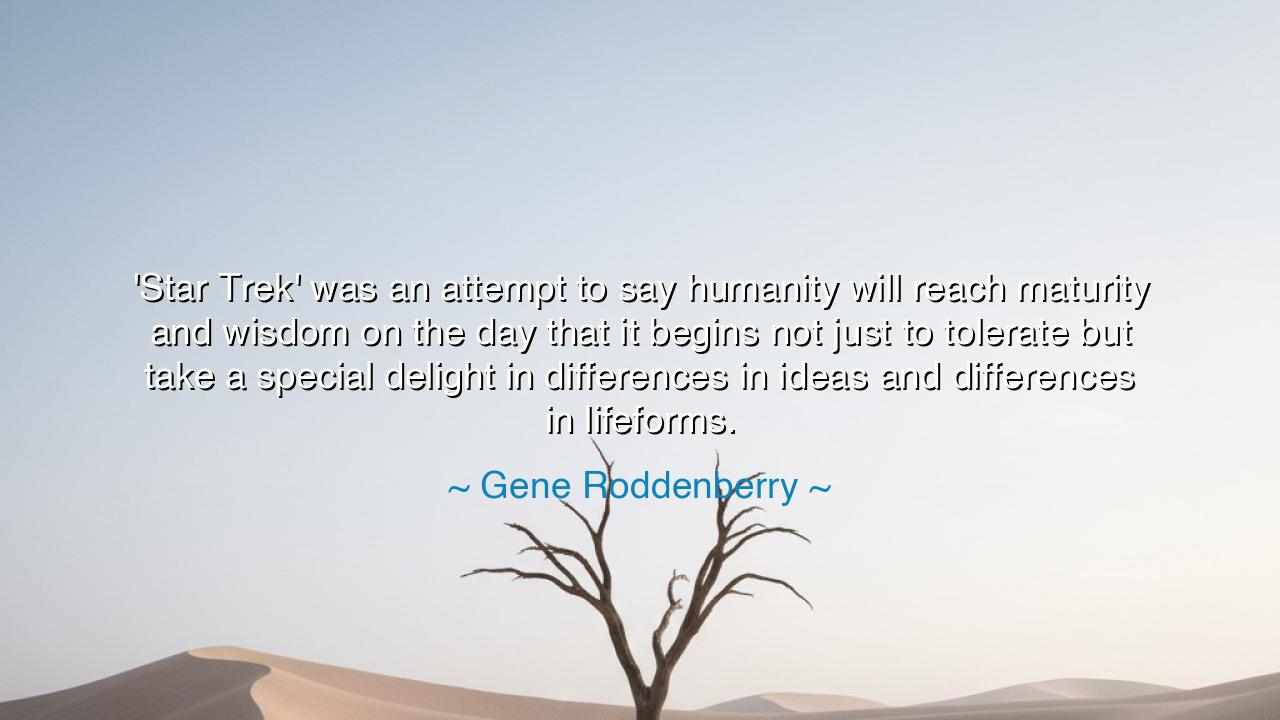
'Star Trek' was an attempt to say humanity will reach maturity
'Star Trek' was an attempt to say humanity will reach maturity and wisdom on the day that it begins not just to tolerate but take a special delight in differences in ideas and differences in lifeforms.






“'Star Trek' was an attempt to say humanity will reach maturity and wisdom on the day that it begins not just to tolerate but take a special delight in differences in ideas and differences in lifeforms.” These words from Gene Roddenberry encapsulate a vision of a future in which humanity has transcended its divisions and learned to embrace the vast diversity of thought, culture, and existence. In his creation of Star Trek, Roddenberry envisioned a world — indeed, a universe — where the ultimate measure of wisdom is not the suppression of difference but the celebration of it. He believed that true maturity comes when we no longer just endure diversity but actively delight in it, seeing it as a source of strength rather than division.
The ancients were no strangers to the challenges of tolerance and wisdom in the face of difference. In Greece, the philosopher Heraclitus spoke of the unity of opposites, recognizing that in the diversity of life lies its balance. Heraclitus believed that the world is in a constant state of flux, and it is through the acceptance of change and contradiction that true wisdom can be found. Similarly, Plato’s Republic spoke of the ideal state where individuals of different temperaments and skills contribute to the common good, a state that thrives on the harmony of diverse ideas and roles. Like Roddenberry, Plato saw the future of society as one where differences are not just tolerated, but celebrated for the unity they can create.
Consider the example of Mahatma Gandhi, who, in his quest for Indian independence, embraced the diversity of India's people. His philosophy was rooted in non-violence, but also in the celebration of India’s many cultures, languages, and traditions. Gandhi understood that true maturity could only come when all these differences were respected and united under the banner of freedom. His ability to weave together the diverse voices of India’s people — from different religions, regions, and castes — is a testament to his belief that wisdom comes not from uniformity, but from the respectful acknowledgment of difference.
In the modern world, Nelson Mandela offers another striking example of this wisdom. After decades of racial oppression in South Africa, Mandela chose to lead his country toward reconciliation rather than revenge. He recognized that true maturity as a nation would come not through the eradication of differences, but through the celebration of diversity, particularly in the face of apartheid’s legacy. His commitment to a multicultural South Africa, where diverse cultures could coexist with mutual respect and admiration, reflects Roddenberry’s ideal of wisdom achieved through the embrace of difference. Mandela’s leadership was a living embodiment of the idea that maturity and wisdom come when we honor and delight in what makes us different, rather than viewing it as a threat.
Roddenberry’s words remind us that the path to true wisdom is not in sameness, but in the celebration of our differences. Whether in the vast, imagined universe of Star Trek or in the real world of human history, maturity as a species requires us to see diversity not as a weakness, but as a wellspring of strength. The human race will find its highest form of wisdom when we no longer just tolerate the divergence of ideas, cultures, and lifeforms, but actively seek out the richness they bring to our existence.
In conclusion, Roddenberry’s vision calls upon us to embrace the full spectrum of humanity and lifeforms, understanding that it is not in uniformity, but in diversity, that our wisdom is shaped. True maturity comes when we find joy in our differences, seeing them as opportunities for growth rather than sources of conflict. As we look to the future, may we follow the wisdom of those who have taught us that it is only through understanding and embracing the differences in our world that we can truly progress as a species.






TQMai Nguyen thi quynh
Roddenberry’s words make me question the standards by which we measure human progress. Are technological achievements meaningless without a corresponding ethical and cultural maturity? I feel intrigued by the idea that celebrating differences is the true mark of advancement. How might this principle guide modern policymaking, education, or intercultural dialogue? Could this approach be applied beyond fiction to foster more cooperative and empathetic societies, or is it primarily a philosophical ideal that inspires rather than directs action?
DDDu Du
This statement prompts me to consider the relationship between imagination and moral development. If humanity reaches wisdom by delighting in differences, does that mean education and exposure to diverse perspectives are essential? I wonder how media representations of inclusivity and cooperation, like in 'Star Trek', impact the audience’s worldview. Is this delight in diversity something that can be cultivated systematically, or does it require personal openness and curiosity to fully develop?
ALAnh Le
I find this quote both inspiring and challenging. It implies that human maturity is measured by our ability to embrace diversity fully. I’m curious whether Roddenberry saw this as a slow evolutionary process or something achievable through conscious effort. How do we translate this vision into real-world actions, both in communities and in global politics? Could science fiction serve as a blueprint for social progress, or is it mainly a reflection of our aspirations?
MKquach Minh Khoi
Reading this makes me reflect on the aspirational nature of science fiction as a mirror for humanity’s potential. I wonder if Roddenberry is suggesting that true wisdom isn’t just tolerance but a celebration of difference. How practical is this ideal in today’s world, where divisions and prejudices still exist? Can popular media like 'Star Trek' genuinely influence societal values, or is it more of a hopeful vision that inspires individuals to think differently?